June 21, 2025 | 01:02 GMT +7
June 21, 2025 | 01:02 GMT +7
Hotline: 0913.378.918
June 21, 2025 | 01:02 GMT +7
Hotline: 0913.378.918
Tay Ninh was once a renowned R war zone. During the Doi Moi period, Tay Ninh was well-known for 5 unique agricultural products including sugar cane, shrimp salt, cassava, rubber latex and custard apple.
Old farmer Vo Van Ten, a resident of Suoi Da commune, Duong Minh Chau district, Tay Ninh province, was so well-known on the old R battlefield that even district-level authorities knew of him. In addition to being a notable producer and a centrally-recognized farmer, he was also dubbed the "king of planted forest." He devoted his entire youth to reforestation efforts. At age 80, he continues his work with the forest to maintain the verdant hue of the Southwest's frontiers.
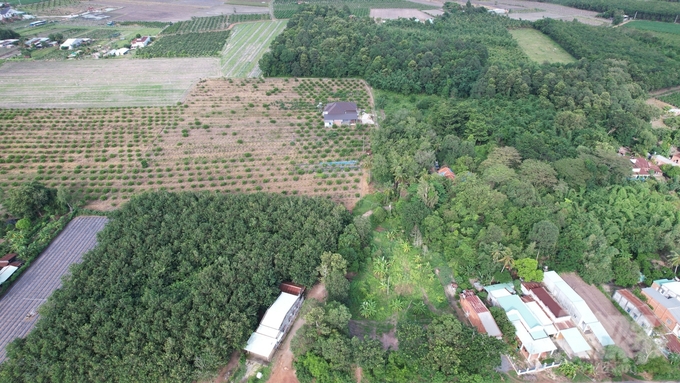
A corner of Mr. Vo Van Ten family's forest at the foot of Ba Den mountain in Duong Minh Chau district (Tay Ninh). Photo: Tran Trung.
Ten, despite being 80 years old, appears vivacious and shrewd as he guides us to the horizontal forest he has constructed with his own hands over many decades. Mr. Ten proudly stated, in the past, from the Xa Mat border gate back is Lo Go - Xa Mat National Park, and the forest extended to the base of the Central Department of the South (Tan Lap, Tan Bien, and Tay Ninh) when introducing his Asian Padauk - the precious wood included in group I that is protected and listed in the Vietnam Red Book (2007) with an age of nearly 30 years.
This ancient forest was home to several valuable woods, including freshwater mangrove, wild almond, etc.
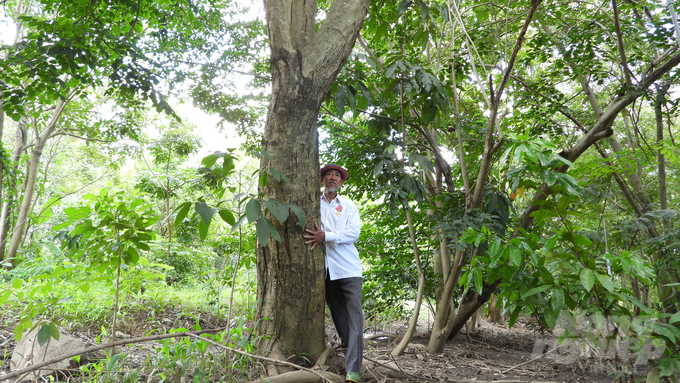
Mr. Vo Van Ten next to the Asian Padauk - the precious wood included in group I that is protected and listed in the Vietnam Red Book (2007) with an age of nearly 30 years. Photo: Tran Trung.
In Tay Ninh, those who own more than 100 hectares of land are renowned, but Mr. Vo Van Ten is the only one who engages in afforestation. In the 1980s, when his family owned 1 hectare of land, he concentrated, like many other locals, on investing in cassava cultivation. In addition, both he and his wife were employed.
There is experience with the cultivation of cassava and custard apples, but forestry is a different story. Mr. Ten stated that the forest has the benefit of requiring little maintenance, but it is extremely flammable; all it takes is one flare to consume one's entire heart and soul, as he once experienced.
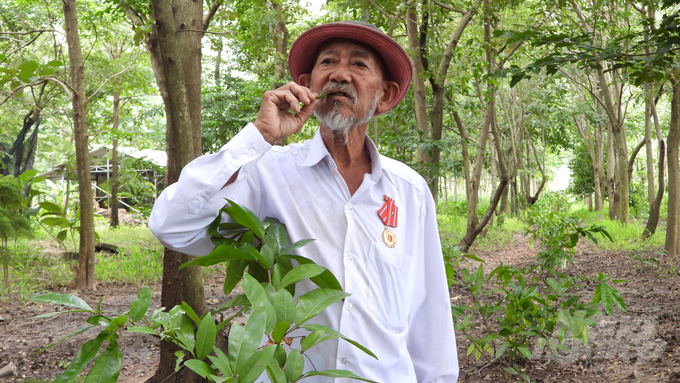
Mr. Ten intensively cultivates wild vegetables under the forest canopy to grow short-term and improve his livelihood. Photo: Tran Trung.
Mr. Ten, fearless in the face of adversity, sought out provincial and non-provincial forestry officials to exchange information, gain experience, and discuss his desire to plant forests. Recognizing the passion of this elderly farmer, the forest rangers accompanied him, advising him on the distance between forest trees, the quantity of water to use for irrigation, how to prune branches, the categories of pests, etc. Creating beds to construct roads for vehicles to battle forest fires was also done methodically by Mr. Ten.
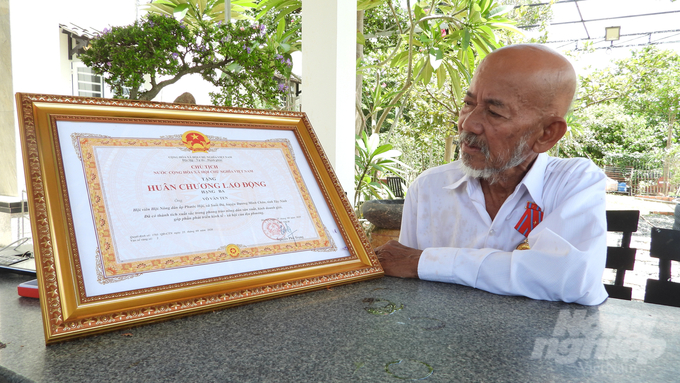
In recognition of Mr. Vo Van Ten's contribution, the President awarded the Labor Medal, Class 3 - a noble reward for a farmer, and he deserves it. Photo: Tran Trung.
When the forest trees were well-established, Mr. Ten abandoned the custard apple and gave the land to rosewood, redwood, green ironwood, etc. to grow into a forest at the base of the mountain. Under the forest canopy, he planted natural vegetables to create a landscape and generate a sufficient income to sustain himself and his family without cutting down any trees.
Mr. Ten was concerned in 2000, when locals flocked to the Dau Tieng semi-flooded area to cultivate cassava, causing severe damage to the water resource, and environment, and a risk of disasters.
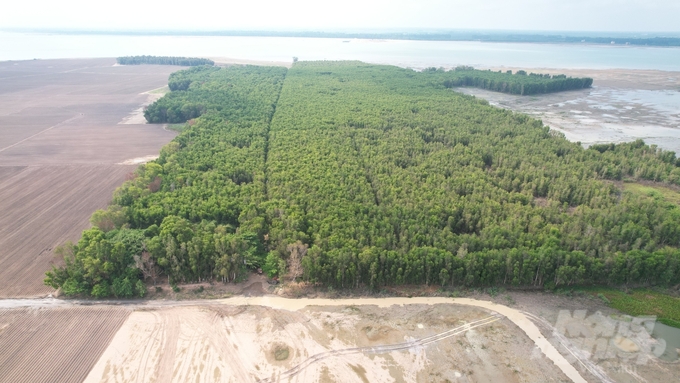
A corner of the Melaleuca forest and the golden shell of Mr. Ten's family on the semi-flooded area of Dau Tieng lake. Photo: Tran Trung.
According to Mr. Ten, the Dau Tieng lake is a multipurpose structure that provides water for production, living, and industrial activities for millions of people throughout the region, including residents of Tay Ninh. Mr. Ten rummaged around for appropriate forest varieties to plant in semi-flooded areas in an effort to prevent soil erosion and landslides. Cheesewood and water melaleuca are two well-adapted cultivars in this region.
Mr. Ten explained the nearly 1-meter-high melaleuca roots as follows: wherever water inundates the soil, the melaleuca roots develop. Afforestation is not only for timber, but also for numerous other benefits, such as contributing to ecological equilibrium, preventing erosion, preserving water for the watershed forests of the Dau Tieng reservoir, and providing a habitat and spawning ground for birds and fish. He will only exploit trees that are ancient or damaged, as he considers healthy trees to be treasures and treats them with honor.
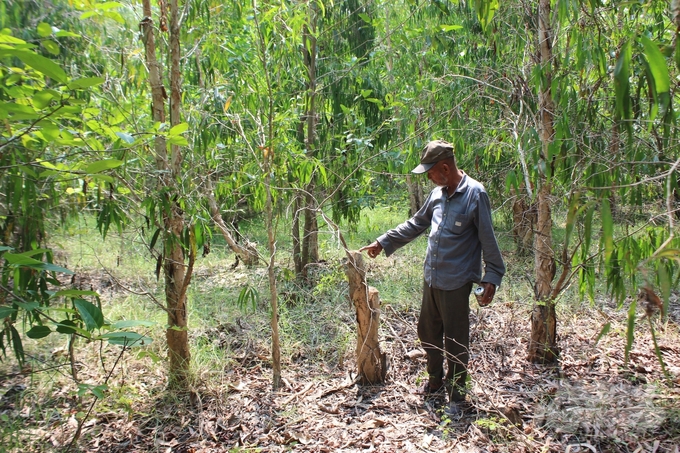
The yellow cheesewood is cared for by Mr. Ten in the semi-flooded area of Dau Tieng lake. Photo: Tran Trung.
Mr. Ten was ecstatic when he recently learned that the initiative to plant one billion trees had been authorized by the prime minister, as it validated the efforts of farmers like himself in afforestation. Despite our enthusiasm, planting a forest is challenging, and maintaining it is even more so. How many arid seasons have passed, and how many times has he faced the risk of forest fires because a portion of the land was scorching while people went to capture bees.
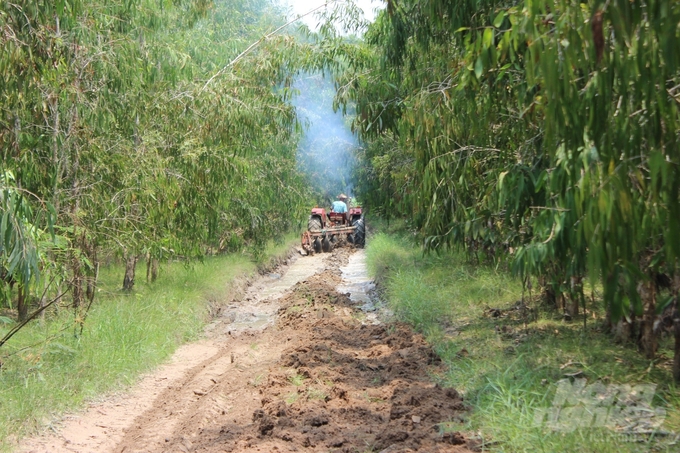
Mr. Ten brought in machinery to make a fire barrier to prevent forest fires. Photo: Tran Trung.
During the arid season, the lake water recedes, revealing partially submerged land. On this partially inundated land, producers plant short-term commodities such as cassava, melons, and beans before the flood season engulfs everything. It is profitable to farm on semi-flooded land, but doing so has negative effects on the water environment.
The province of Tay Ninh has repeatedly planted various species of forest trees to safeguard the environment, reduce flood flows, limit soil erosion, and reduce the impact of waves on the dyke system. The water source fluctuates, as Dau Tieng Lake functions according to its own process. At water levels between 22 and 26 meters, it is difficult to locate trees that can endure when their trunks are submerged.
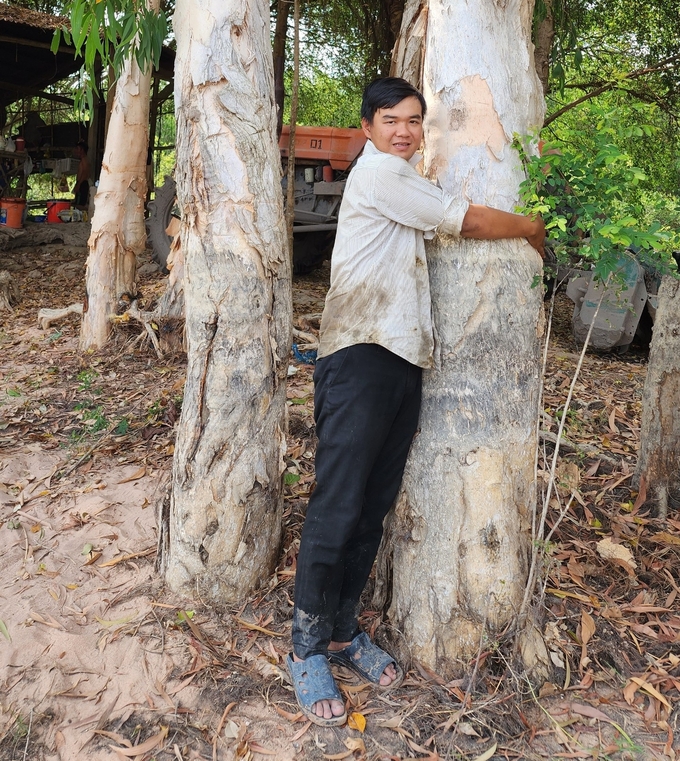
His son Ten shares his father's "legacy" and promises to keep it for future generations. Photo: Courtesy of Ten.
Mr. Vo Duc Trong, Vice Chairman of the Provincial People's Committee of Tay Ninh, acknowledged that the protection of forests must be improved in principle. The ability of individuals to plant their own forests is valuable, and the government completely supports and encourages this practice.
Translated by Linh Linh
![Turning wind and rain into action: [9] Digitizing hydrometeorological data in response to climate change](https://t.ex-cdn.com/nongnghiepmoitruong.vn/608w/files/news/2025/06/17/z6704423696987_15fd32ffc26d590d204d520c9dac6786-nongnghiep-165943.jpg)
(VAN) Farmers have begun accessing hydrometeorological applications to adjust their cropping schedules, aiming to ensure productivity and adapt to climate change.
![Turning wind and rain into action: [8] Real-time salinity detection and early warning technology](https://t.ex-cdn.com/nongnghiepmoitruong.vn/608w/files/news/2025/06/17/z6704423696987_15fd32ffc26d590d204d520c9dac6786-nongnghiep-151127.jpg)
(VAN) Thanks to the integration of modern hydrological-hydraulic models, remote sensing technologies, and artificial intelligence, the accuracy of hydrological forecasting has significantly improved.
![Turning wind and rain into action: [7] Early disaster warnings help marine farmers minimize losses](https://t.ex-cdn.com/nongnghiepmoitruong.vn/608w/files/news/2025/06/17/z6704423696987_15fd32ffc26d590d204d520c9dac6786-nongnghiep-142942.jpg)
(VAN) In recent years, thanks to early disaster warnings and forecasting, marine farmers in Khanh Hoa province have been able to reduce risks and losses, thereby improving production efficiency.
![Turning wind and rain into action: [6] ‘Four on-the-spot’ disaster management software](https://t.ex-cdn.com/nongnghiepmoitruong.vn/608w/files/news/2025/06/17/e5a48259d6a262fc3bb3-nongnghiep-183800.jpg)
(VAN) By simply activating the scenario on the disaster management software, the relevant authorities immediately know how many households need to be evacuated, where to evacuate them to, and by what means of transportation…
![Turning wind and rain into action: [5] Hue applies modern technology in disaster forecasting](https://t.ex-cdn.com/nongnghiepmoitruong.vn/608w/files/news/2025/06/17/z6704423696987_15fd32ffc26d590d204d520c9dac6786-nongnghiep-093938.jpg)
(VAN) In Hue city, modern technology has recently been applied in meteorological and hydrological forecasting and warning, helping to reduce the damage caused by natural disasters.

(VAN) A cutting-edge farming technique being implemented on an experimental ranch in Arizona's Sonoran Desert has already saved a billion gallons of water over five years, according to Civil Eats.

(VAN) Poultry and pig production and the environment can be boosted through enhanced water technology, according to new research.